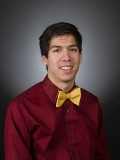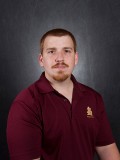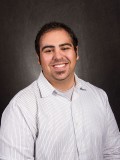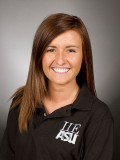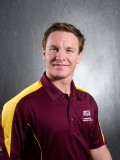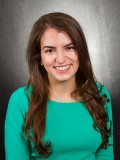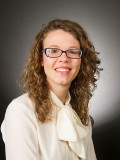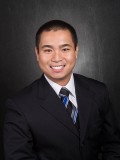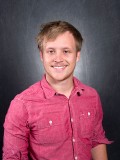
Spring 2014 Distinguished ASU Engineering Graduates
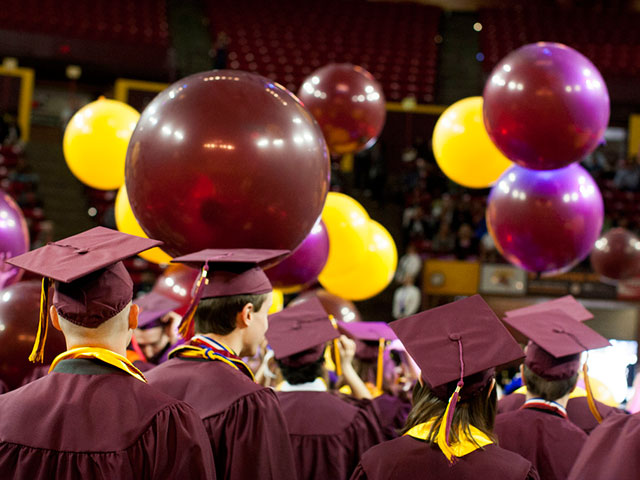
Each spring and fall semester special recognition is bestowed upon high-achieving and exemplary students graduating from Arizona State University’s Ira A. Fulton Schools of Engineering.
Among those honorees several students are selected as Distinguished Graduates, honored primarily for their significant contributions and accomplishments beyond the classroom.
These students have excelled in one or more areas of research, leadership, public service and social entrepreneurship endeavors that have had beneficial impacts on the ASU community as well as larger communities in Arizona and elsewhere.
Many have participated in study-abroad programs, K-12 education outreach, tutored fellow college students, and led student teams to awards in national and international engineering and technology competitions.
Others have represented ASU positively through their work in internships in industry and volunteer efforts to provide aid to communities and people in need, or have served ASU and the Fulton Schools of Engineering as ambassadors to raise public awareness about the educational mission of the university.
The students selected as Distinguished Graduates for the 2014 spring semester are:
- Nicolas Luis Corrales, Distinguished Graduate in Mechanical Engineering
- Andrew John Creighton, Distinguished Graduate in Aerospace Engineering
- Nickolas DePalma, Distinguished Graduate in Computer Systems Engineering
- Jennifer Fritz, Disinguished Graduate in Industrial Engineering
- Elliot Hanson, Distinguished Graduate in Electrical Engineering
- Noelle Rabiah, Distinguished Graduate in Chemical Engineering
- Abbey Rose Soulek, Distinguished Graduate in Biomedical Engineering
- Jonathan Tran, Distinguished Graduate in Industrial Engineering
- Christopher Workman, Distinguished Graduate in Biomedical Engineering
Nicolas Luis Corrales
Nicolos Luis Corrales, Distinguished Graduate in Mechanical Engineering, said his education beyond the classroom was a highlight of his undergrad years.
Choosing to major in mechanical engineering “was pretty much a no-brainer for me,” Nicolas Corrales said. “Ever since I was a young child I knew exactly what I wanted to do when I grew up, that was to design the coolest cars around.”
At Red Mountain High School in his hometown of Mesa, he had the opportunity to study in an engineering program where he learned that becoming a mechanical engineer would best prepare him for working in the automotive industry.
To that major at ASU, he added a concentration in computational and mathematical mechanics. His academic record earned him an ASU New American University Scholarship — Dean’s Award
He accumulated a 3.3 grade point average in his undergraduate studies.
Corrales said his education beyond the classroom was a highlight of his undergrad years.
For three years he was a member of the ASU chapter of the Society of Automotive Engineers (SAE), through which he joined teams that designed and manufactured vehicles that were entered in intercollegiate automotive competitions.
He served as the SAE@ASU’s outreach coordinator, helping to manage the group’s events to introduce the basics of the engineering design and testing processes to elementary and middle school students. He estimates he volunteered more than 100 hours of his time to these outreach activities.
Corrales also got involved in helping with the E2 Camp welcome activity for freshmen engineering students and campus engineering career fairs.
For SAE’s assistance in putting on a recent career fair and developing a strategy to improve the process of line management at future career fairs, Corrales was recently presented the Process Improvement award at the Fulton Schools of Engineering Student Organization Awards and Recognition ceremony.
Playing key roles in these events to support the campus engineering community “helped to make my ASU experience awesome,” he said.
Corrales will stay at ASU for another year to earn a master’s degree in mechanical engineering through the Fulton Schools of Engineering 4+1 accelerated graduate degree program. Then he plans to begin a research and development career in the automotive industry, with aspirations to “design the next awesome car.”
Outside of engineering expertise, Corrales is a skilled competitive gymnast, having trained for a decade before going to college. He was ranked as high as fourth place in the state during his senior year in high school.
His gymnastic abilities earned him a place on the Phoenix Suns Sol Patrol “dunk squad,” which performs acrobatics at the Suns’ pro basketball games.
It was during the performance of one acrobatic dunk, Corrales recalls, that “instead of dunking only the basketball through the hoop, I accidently dunked my entire body through the hoop.”
That unexpected performance highlight led to Corrales being interviewed by local and national TV news shows. “It was definitely an experience I didn’t think I would have during my college years,” he said.
Andrew John Creighton
Andrew John Creighton, Distinguished Graduate in Aerospace Engineering, found the most challenging aspect of his undergraduate years to eventually be the most rewarding.
Andrew Creighton found the most challenging aspect of his undergraduate years to eventually be the most rewarding.
As a student in ASU’s Barrett, The Honors College, Creighton completed coursework for two majors – in aerospace engineering and political science – plus a minor in mathematics plus an academic certificate in international studies – all the while working a series of part-time jobs on campus.
“It required me to push myself to my limits every semester,” he said.
Despite the demands of such a heavy load, he made the dean’s list each semester, finished his courses with a grade point average of 3.80, and in two semesters took a particularly daunting number of courses.
“The biggest reward from this pursuit is the knowledge that I have twice completed a semester enrolled in courses totaling 29 credits, an achievement few can match and fewer universities would even allow,” he said.
In addition, he managed to work a summer internship in 2013 with Boeing, the major aerospace company.
To aid his pursuit of a bachelor’s degree, his academic accomplishments helped him earn ASU’s New American University Scholarship — President’s Award, a scholarship from the Boeing company and a scholarship from Tau Beta Pi, the national engineering honor society.
Creighton has plans for more academic challenges. He wants to eventually earn a master’s degree in either electrical engineering or mechanical engineering.
First, he will to enter the workforce in the aerospace and defense industry. He has accepted a full-time position as a systems engineer with Raytheon Missile Systems.
The 2010 graduate of Mesquite High School in his hometown of Gilbert, Ariz., participated in the Fulton Undergraduate Research Initiative (FURI) and Engineering Projects In Community Service (EPICS).
In FURI he studied federal regulation of landings and takeoffs of commercial aircraft, with the goal of identifying and formulating solutions to technical and legal flaws within the regulations.
In EPICS, he was team leader for a community service project and later was a teaching assistant in EPICS courses for three semesters.
Creighton also participated in several campus student organizations, and served as an officer and as president of two organizations.
His interest in science, math and problem solving, along with aircraft and space, led him to choose to study engineering at ASU. He also developed another keen interest during his college years: travelling.
Creighton travelled to England, France and Italy during one break between semesters, and later visited Seattle and Washington, D.C. He has planned a trip to Costa Rica soon after graduation and is currently saving up for a trip to Asia this coming winter.
Nickolas DePalma
Nickolas DePalma, Distinguished Graduate in Computer Systems Engineering, said the most rewarding parts of college were internships and work experience.
Nickolas DePalma spent a year with his roommate writing, directing and filming, “The Scarying,” which they entered in the Phoenix Film Festival. DePalma describes it as the greatest film ever made.
“If we were both not engineers, I am sure we would be off in Hollywood searching for fame,” DePalma said.
DePalma was born in New Jersey, but raised in Gilbert. He graduated from Mesquite High School and came to ASU with a full scholarship.
“I wanted to stay relatively close to home, and the engineering program looked very good compared to other schools,” DePalma said.
Engineering was in the genes.
“I come from a family of engineers and I just naturally gravitated towards the field,” DePalma said. “I chose computer systems engineering, and information assurance, because my father is a computer engineer and I was really interested in his work.”
From his grandfather, he also got his love of the New York Yankees.
“I am a huge baseball fan,” DePalma said. “Some of my fondest memories are of us watching Yankee games and cheering and jeering at the TV.”
DePalma received the New American University Scholarship – President’s Award and the Dean’s Exemplar Student Scholarship.
He was on the Dean’s List multiple times, was a nominee for outstanding engineer during the Greater Phoenix Area eWeek. His GPA is 3.39.
DePalma was a member of the Fulton Ambassadors paraprofessional organization, serving as director of high school visits, and as president, overseeing the group of more than 60 engineering students.
“My biggest achievement was the recruitment of our new class of ambassadors in the fall of 2013,” DePalma said. “More than 100 students applied, roughly 65 were interviewed, and 37 members were granted a spot. Each of those 37 members are highly involved and successful engineering students who will, no doubt, be recognized as such in the coming years.”
DePalma said the most rewarding parts of college were internships and work experience.
“The Fulton Engineering Career Fair is my favorite event and both of the internships that I was a part of, American Express and Intel, I got directly through the fair,” he said.
The most challenging thing was balancing school, a social life, and running a student organization. DePalma said that, in his spare time, he watches baseball, rooting for the Yankees, his grandfather’s favorite team.
DePalma will be part of the leadership development program at American Express. During 18-month program, he will rotate through different jobs within the company.
He hopes to continue to develop skills in information assurance.
“As the world becomes more digital, computer crime will only rise,” DePalma said. “My hope is to be a part of something that will make the world a safer place for everyone who uses a computer.”
Jennifer Fritz
Jennifer Fritz, Distinguished Graduate in Industrial Engineering, found her passion to be in industrial engineering.
Jennifer Fritz was chosen “Most likely to take a picture with Dean Johnson” in 2013.
She was born in Lodi, Calif., but said that growing up in Chandler and graduating from Chandler High School, she was surrounded by ASU culture.
“It just became a part of who I was supposed to be and where I was supposed to go,” she said.
Fritz thought she would major in business communications, but decided on electrical engineering because she loved math and analytical problem solving. Later, she found her passion to be in industrial engineering.
“When I was a freshman, I had no idea what to expect going into engineering and the first thing that built my confidence was my E2 Camp mentor,” Fritz said. “She opened my eyes to how many opportunities we have as engineers to not only create a great future for ourselves but to also have an amazing experience while doing so.”
That experience led Fritz to be a peer mentor herself.
“As a peer mentor I feel as though I contribute to making engineers feel like a family,” Fritz said. “After being a peer mentor and an E2 Camp counselor for three years, helping freshman conquer their goals within engineering, I know that I am ready for the next step as a real-life engineer.”
Fritz received a New American University — Dean’s Award each year, was Peer Mentor of the Year and Returning Peer Mentor of the Year.
She worked at IO Data Centers where she implemented 5S safety methodology, reduced inventory shortages, and improved inventory accuracy. She also was an intern at Systems 3, Inc., helping with their inspection and quality of machined parts, designed a new floor layout, and optimized worker to machine utilization. Her senior design project is to improve patient throughput in the phlebotomy lab at Banner MD Anderson Cancer Center, decreasing wait times.
Fritz is treasurer of the student chapter of Institute of Industrial Engineers (IIE), and helped plan for the organization’s regional conference.
“Being on the executive board of IIE entails a lot of planning for the IIE Regional Conference, setting up and organizing the flow of the Engineering Career fairs, and setting up engineering plant tours and info sessions for our members to get experience interacting with industry speakers and professional engineers,” Fritz said.
She will work as a manufacturing engineer at IM Flash Technologies, a joint venture between Intel and Micron Technologies, in Lehi, Utah. She hopes to take her Jeep off road in Moab and go hiking.
“My long-term career aspirations are starting my own business, just like my parents, and ultimately, making a positive difference in the world by helping others. I know that being an engineer I have the capability to be a part of numerous projects and my goal is to strive for engineering achievements in every project I am a part of.”
Elliot Hanson
Elliot Hanson, Distinguished Graduate in Electrical Engineering, knew from an early age that he wanted to be an engineer.
Elliot Hanson was born in San Francisco, but grew up in Albuquerque. He graduated from a small college-preparatory high school, the Albuquerque Academy, where he was an all-state baseball player, winning the New Mexico state championship in his junior year.
“I came to ASU for its size,” Hanson said. “Albuquerque Academy was a small high school where everyone knew each other’s names, so I knew I wanted to experience a large school. Naturally, I chose the largest. Also, Barrett, The Honors College was appealing, as well as the engineering school.”
Hanson knew from an early age that he wanted to be an engineer.
“My dad is a structural engineer in Albuquerque, so I was interested in civil engineering from an early age,” he said.
While shadowing electrical engineers at Boeing’s office in Albuquerque, he decided that was his calling.
“The overriding reasons for my decision being the fact that electrical engineers are involved in just about every possible engineering project, to some degree, and that the stuff the electrical engineers were doing at Boeing was so cool,” Hanson said.
Hanson, a Barrett student, received the New American University Scholarship – President’s Award, as well as the Dean’s Exemplar Student Scholarship. He has a GPA of 3.87 and has been on the Dean’s List for all but one semester. He also was nominated for the Greater Phoenix Area eWeek Engineering Student of the Year in 2014.
Hanson has been on the men’s rugby team, and is president of the ASU chapter of IEEE- Eta Kappa Nu, the electrical engineering honors society.
“My biggest achievement as a member of Eta Kappa Nu was being able to represent the ASU chapter as an officer at the 2013 National conference, hosted by ASU,” Hanson said.
Hanson said the most rewarding, and most challenging, part of his studies has been his senior design project, which required “learning on the fly,” with professors Rodolfo Diaz and James Aberle, both associate professors in the School of Electrical, Computer and Energy Engineering.
After graduation, he plans to work on a master’s degree in electrical engineering through the 4+1 accelerated degree program. During the summer, he will be an intern at Raytheon Missile Systems in Tucson.
He hopes to work in the defense industry.
“My long-term career aspirations are to have a career in an ever-evolving field so I can continue to build my knowledge, and have a satisfying work career,” he said.
Noelle Rabiah
Noelle Rabiah, Distinguished Graduate in Chemical Engineering, will graduate after only three years of undergraduate study and plans to pursue a doctorate in the field at Stanford University.
Even though her parents and one of her sisters graduated from ASU – and her father and that sister studied electrical engineering – Noelle Rabiah said she hasn’t simply been following in the family footsteps.
The graduate of Desert Mountain High School in her hometown of Scottsdale, Ariz., said she chose ASU because of the favorable reputations of its engineering programs and Barrett, The Honors College. And she veered onto her own path in choosing to major in chemical engineering.
Rabiah will graduate after only three years of undergraduate study and plans to pursue a doctorate in the field at Stanford University. She was chosen from a select group of high-achieving students for a Stanford Graduate Fellowship in Science and Engineering.
An exceptional record of academic accomplishment and extracurricular involvement helped win her the sought-after Stanford fellowship.
She maintained a perfect 4.0 grade point average, which earned her a Mouer Award. She was also a recipient of the ASU New American University Scholarship — President’s Award, the Scottsdale Youth Leadership Scholarship for both academic excellence and community service, as well as the Dean’s Exemplar Student Scholarship for leadership, performance and involvement in the engineering community.
A student in ASU’s Barrett, The Honors College, Rabiah used as the focal point of her honors thesis the work she did through Fulton Undergraduate Research Initiative. For that project she synthesized and characterized composite nanoparticles, leading to a poster presentation of the research at the national student conference of the American Institute of Chemical Engineers (AIChE) and credit as a coauthor on two publications in research journals.
Her honors thesis was one of only four to win an Outstanding Honors Thesis award among students in degree programs in the School for Engineering of Matter, Transport and Energy.
She was an officer in the ASU chapter of AIChE, an outreach director for the Society of Women Engineers student chapter and an undergraduate teaching assistant for three semesters.
In addition, Rabiah served as a Fulton Ambassador, representing ASU’s engineering schools in providing campus tours, presentations and college “shadow days” to high school students who are considering studying engineering. She also helped to mentor younger students.
“My reluctance to study engineering prior to high school inspires me to encourage other young women to study engineering.” Rabiah said. “A common stereotype about engineering is that it is not feminine, an idea that springs from lack of education about the field. I was fortunate to have a sister to draw my attention to engineering, and I want to do the same for others.”
Her experience in an internship last summer doing research for Henkel, a major consumer goods company, cemented her aspiration to eventually find a role in the research and development industry, particularly one that would bring the benefits of the latest biotechnology advances to the public.
Rabiah’s work at Henkel resulted in a patent-pending for a new chemical formula interaction she helped to develop.
Apart from academic and career pursuits, Rabiah said she hopes to eventually nurture her artistic side by resuming the drawing and painting she once did regularly.
Perhaps, she adds, she may even apply what she’s learned in recent years about chemistry and chemical engineering to experiment with the use of various painting and drawing materials and methods.
Abbey Rose Soulek
Abbey Rose Soulek, Distinguished Graduate in Biomedical Engineering, has been able to apply lessons learned in the classroom to the world of industry, making the transition into industry smooth.
Abbey Soulek had plans to earn an English degree in college until her senior year at St. Thomas More High School in her home state of South Dakota, when she “found out that I loved applied mathematics.”
That turned her attention to an engineering degree. An interest in medicine and medical technology led her to a biomedical engineering major — and to Arizona after an offer of a ASU New American University Scholarship — President’s Award.
Her academic success also helped her win a Vicky and Troy Wilson Scholarship and a Black Hills Corporations Scholarship on the way to a 3.7 grade point average and making the dean’s list in each semester but one.
Outside the classroom, she has gained valuable research experience in both the public and private sectors. Through the Fulton Undergraduate Research Initiative she worked on a project to improve prosthetics limbs. A full-time summer internship in 2012 with a private health and medical research institution gave her the opportunity to do further cardiovascular work.
Since the summer of 2013, she has been an intern for the Tempe operations of a multinational company that manufactures and develops new medical devices.
Her work in the laboratory and as a developing biomedical engineer has earned Soulek the opportunity to remain in her intern position after graduation, but she is also interviewing with several medical device design and development companies.
“One of the most rewarding parts of my undergraduate years has been being able to apply a good portion of the lessons I learned in the classroom to the world of industry,” she said. “All the hard work that went into gaining an understanding of difficult concepts has made my transition into industry go smoothly. This has made me really appreciate my education.”
Soulek also spent a good deal of time helping other students through their education process.
She served as a counselor at E2 Camp, the summer orientation experience for incoming ASU engineering freshmen.
Through work with the campus Engineering Career Center, she has given presentations to members of various student engineering clubs, helped students develop effective résumés and assisted in coordinating career development events for students.
That experience will be valuable in reaching her career goals. In addition to mastering the technical side of biomedical engineering, Soulek said she hopes that in about five years she will “be in more of management position and serve as a mentor to younger engineers entering the industry.”
Beyond that, she said she hopes to someday become part of startup company, and play key roles not only in research and development but also in formulating the company’s business mission and ideals.
When not pursuing those career goals, Soulek said she will likely continue to engage in interests spurred by her “love of the outdoors,” particularly hiking mountains, and in a more relaxing mode continue her pastime of designing and making clothes.
Jonathan Tran
Jonathan Tran, Distinguished Graduate in Industrial Engineering, hopes to contribute to the green revolution in the transportation industry.
Jonathan Tran is from Poughkeepsie, N.Y., but grew up in Chandler and graduated from Corona del Sol High School in Tempe. He played football and the guitar and thought about going professional in sports or music.
Instead, he chose ASU, in part because it was close to home and had great business and engineering programs.
“I really enjoy living in Arizona, plus it was nice to be only a drive away from my family,” Tran said.
Tran said his father was a big influence in choosing engineering.
“Growing up, I was exposed by my father to technology and computer hardware,” Tran said. “I was fairly tech savvy, but thought I wanted to major in business. I was encouraged to try engineering and, after switching majors a few times, found industrial engineering, which combined technical and mathematical applications, as well as business. Being able to get the best of both worlds in one major sealed the deal for me.”
Tran received University Grants, the New American University Scholarship -Dean’s Award, and the John A. and Helen R. Butler Scholarship, and was on the Dean’s List in 2012. His GPA is 3.22. He was secretary for the ASU chapter of the International Council on Systems Engineering.
“The most rewarding thing about ASU was the experience to meet new people of various age groups and majors, and being able to work on projects with peers from different backgrounds and ways of thinking,” Tran said. “It really helped me expand my knowledge and ways of looking at problems and situations that occur in the world.”
Most difficult, he said, was learning how to balance my school life, personal life and work.
“Most of the time they would conflict with each other so it was struggle at times to balance it all,” he said.
Tran will move to Georgia for a job as a business and data analytic developer for General Motors. He hopes to contribute to the green revolution in the transportation industry.
“My long-term aspiration is to one day start a small business,” he said. “There has always been a small entrepreneurship side of me and I would pursue that later in life.
“I would like to be part of an impact in the transportation industry. There are quite a few advancements recently in that industry relative to green energy and I think it would great to contribute in that.”
Christopher Workman
Christopher Workman, Distinguished Graduate in Biomedical Engineering, studied abroad in Costa Rica where he took courses in Spanish medical language and the Costa Rican health care system, including learning about practicing medicine in tropical regions.
Christopher Workman recalls that even as a youngster he was “amazed by mathematics.” He also “wanted to understand the technology that surrounds us,” and has been “fascinated by the chemical and physical mechanisms that allow us to live.”
In pursuing such far-ranging interests, he has earned degrees in bioengineering and biochemistry as a student in ASU’s Barrett, The Honors College.
It was good impressions of Barrett and the Ira A. Fulton Schools of Engineering that led him to choose ASU. And it was support from his local community that gave him some help getting there.
The graduate of Kingman High School in Kingman, Ariz., earned scholarships from Kingman’s Elks Lodge, Kiwanis Club, the Kingman Regional Medical Center and the town’s Oil Can Henry’s automobile service center.
His academic performance also earned him ASU’s New American University Scholarship — President’s Award, the Dean’s Exemplar Student Award and the Robert C. Byrd Scholarship.
He has justified the investments in his education with an impressive record of achievement.
Workman helped an Engineering Projects in Community Service program (EPICS) student team develop a mobile app, called Freebee, to educate student about health issues. The devise won second place in the National Health Data Collegiate Challenge sponsored by the National Academy of Engineers and the Institute of Health.
A second EPICS project involved a collaboration with the Cornell Lab of Ornithology to develop a wiki app called eBird for bird-watching enthusiasts.
He won a National Science Foundation Research Experience for Undergraduates grant to develop a model for an educational tool to teach students about cerebral aneurysms.
He was awarded a travel grant to attend an international Engineering in Medicine and Biology Society conference to present his work on fabrication of cerebral aneurysm models.
Another travel grant got him to the Biomedical Engineering Society’s Annual Meeting in 2013 to present work on computational modeling and force simulation designed to make football shoulder pads that provide better protection for players.
Workman spent five semesters in the Fulton Undergraduate Research Initiative program intensifying his studies of the behavior of cerebral aneurysms and how to treat them.
Away from the lab, he was secretary and then treasurer of the Alpha Eta Mu Beta Biomedical Engineering Society. He participated in a summer program on cardiovascular medicine at the Arizona Heart Foundation, where he gave a research presentation. He also participated in the Barrett-Mayo Clinic Premedical Scholars program.
With all of that, Workman said one of the most rewarding experiences was getting an opportunity to travel to study in Costa Rica in the summer of 2012. He took courses in Spanish medical language and the Costa Rican health care system, including learning about practicing medicine in tropical regions.
“Living within and learning about a culture different from my own strengthened my resolve to do my best work to serve people,” he said.
Another challenging but “profoundly rewarding” experience was working as a teaching assistant to help younger students in a chemistry lab. He said the role heightened his interest in becoming a skilled educator in addition to other career aspirations.
Workman was accepted in the Fulton Schools of Engineering 4+1 accelerated program, which will give him the opportunity to complete studies for a master’s degree in biomedical engineering in the next year.
Next he plans to attend medical school to become a physician and medical researcher. “I would love to be able to improve the quality of people’s healthcare by designing and testing new medical treatments,” he said.
Outside of schoolwork and lab work, he likes to spend time doing nature photography. He has apprenticed under several landscape photographers, including Pulitzer Prize winner Jack Dykinga.
“I like to unwind by hiking and climbing and creating art with nature,” Workman said.
Media Contacts:
Joe Kullman, [email protected]
480-965-8122
Ira A. Fulton Schools of Engineering
Judy Nichols, [email protected]
480-965-9248
Ira A. Fulton Schools of Engineering































